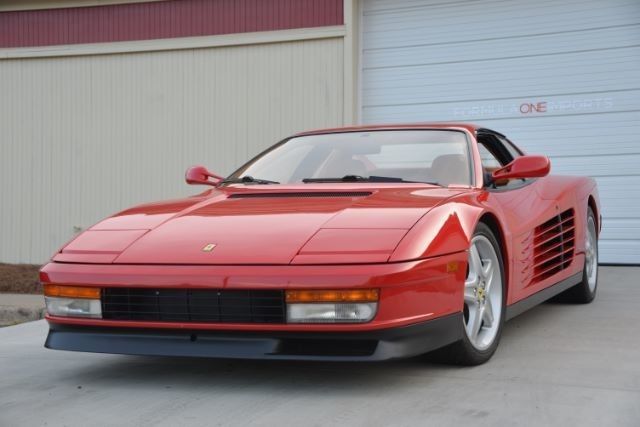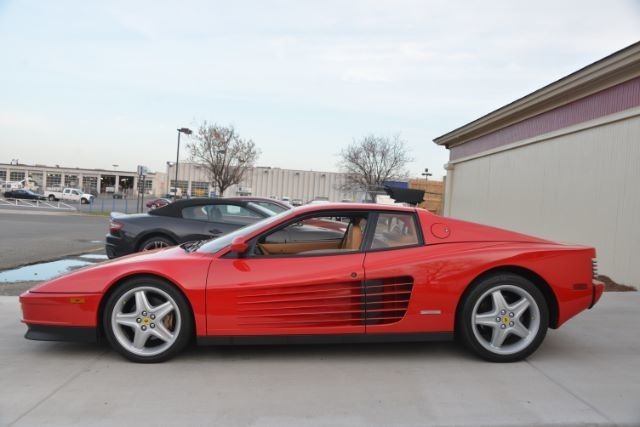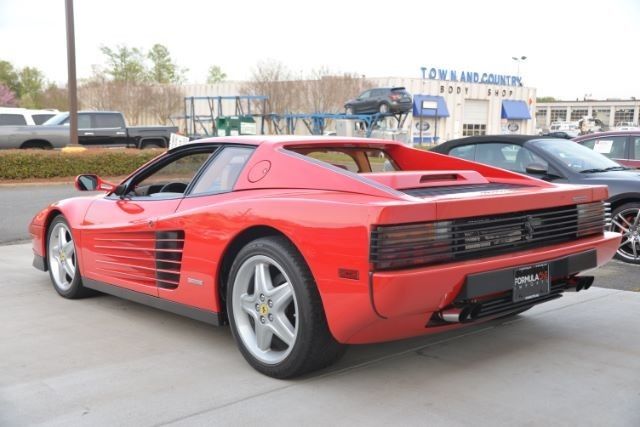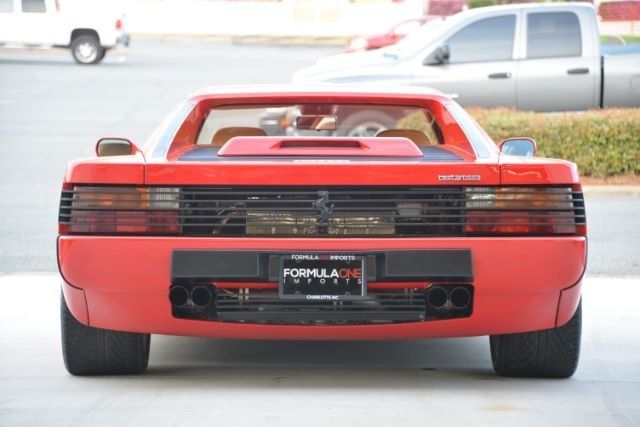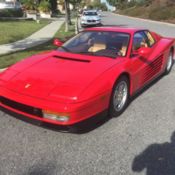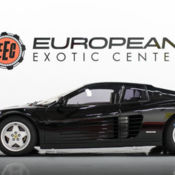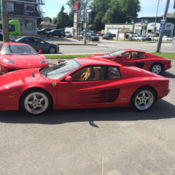|
1990 Ferrari Testarossa 1991 FERRARI TESTAROSSA
ORIGINAL ROSSO CORSA EXTERIOR
BEIGE LEATHER INTERIOR
ONLY 11K MILES
CARFAX CERTIFIED 2 OWNER CAR NO ACCIDENTS NO DAMAGE
WE CAN FINANCE THIS TESTAROSSA FOR UP TO 120 MONTHS !!
SAME LOCAL OWNER LAST 11 YEARS
ALWAYS GARAGE KEPT
MINT CONDITION
THIS CAR HAD MAJOR ENGINE OUT SERVICE AND A METICULOUS DETAIL 100 MILES AGO
CARPET AND FLOOR MATS SHOW ALMOST NO WEAR
ALL ORIGINAL BOOKS AND TOOL KIT ARE INCLUDED
THIS CAR HAS TR WHEELS AND A MARANELLO X OST EXHAUST FITTED
THE ORIGINAL EXHAUST AND WHEELS ARE INCLUDED WITH THE PURCHASE
SOME HISTORY ON THE TESTA ROSSA:
The Testarossa name paid homage to the famed World Sportscar Champion 1957 Ferrari 250 Testa Rossa sports racing car. Testa Rossa, which literally means "red head" in Italian, refers to the red-painted cam covers sported by both cars' 12-cylinder engines. The Testarossa can trace its roots back to the faults of the 1981 512i BB. The problems that the Testarossa was conceived to fix, included a cabin that got increasingly hot from the indoor plumbing that ran between the front-mounted radiator and the midships-mounted engine and a lack of luggage space. To fix these problems Ferrari and Pininfarina designed the Testarossa to be larger than its predecessor, the Berlinetta Boxer. For instance, at 78 inches wide the Testarossa was half a foot wider than the Boxer. This resulted in an increased wheelbase that stretched about 2.5 inches to 100 inches which was used to accommodate luggage in a carpeted storage space under the front forward-opening hood. The increase in length created extra storage space behind the seats in the cabin. Headroom was also increased with a roofline half an inch taller than the Boxer. The design came from Pininfarina. The design team at Pininfarina consisted of Ian Cameron, Guido Campoli, Diego Ottina and Emanuele Nicosia. With little surprise, they were led by design chief Leonardo Fioravanti, the designer of many contemporary Ferraris. The design was originated by Nicosia, but the guidance of Fioravanti was equally important. Being a trained aerodynamist, Fioravanti applied his know-how to set the aerodynamics layout of the car. This meant the large side intakes were not only a statement of style, but actually functional – they drew clean air to cool the side radiators and then went upward and left the car through the ventilation holes located at the engine lid and the tail. As a result, the Testarossa did not need a rear spoiler like Lamborghini's Countach yet produced zero lift at its rear axle. The aerodynamic drag coefficient of 0.36 was also significantly better than the Lamborghini's 0.42.
Engine Type F113A, F113A040, F113A046, F113B, F113B046 Type V12 - 180° ("Flat 12") Position rear, longitudinal Bore and stroke 82 x 78 mm Displacement 4943 cc Compression ratio Between 8.8 : 1 and 9.3 : 1, depending on the version Maximum power 287 kW (390 HP) at 6300 rpm (Euro)
279 kW (380 HP) at 5750 rpm (US) Maximum torque 490 Nm (50 kgm) at 4500 rpm (Euro)
470 Nm (48 kgm) at 4500 rpm (US) Timing system twin overhead camshafts per bank, four valves per cylinder Fuel feed Bosch K-Jetronic (F113A) or Bosch KE-Jetronic (other engine types) Ignition Marelli Microplex, single spark plug per cylinder Lubrication dry sump
Chassis
Type F110AB Frame tubular steel Front suspension independent, unequal-length wishbones, coil springs,
telescopic shock absorbers, anti-roll bar Rear suspension independent, unequal-length wishbones, coil springs,
twin telescopic shock absorbers, anti-roll bar Transmission rear wheel drive Gears 5-speed + reverse Brakes discs, 315 mm (front) / 310 mm (rear) Steering rack-and-pinion, steering diameter of 12.0 m Wheels (front) Single bolt: 210 TR 415 or 8" J x 16
Five-bolt: 8" J x 16 (OZ or Speedline; same design) Wheels (rear) Single bolt: 240 TR 415 or 10" J x 16
Five-bolt: 10" J x 16 (OZ or Speedline; same design) Tyres (front) Michelin 240/45 VR 415 TRX (single bolt, TR wheels), Michelin MXW/MXX 225/50 VR 16,
Bridgestone RE71 225/50 ZR 16 or Goodyear Eagle 225/50 VR 16 Tyres (rear) Michelin 280/45 VR 415 TRX (single bolt, TR wheels), Michelin MXW/MXX 255/50 VR 16,
Bridgestone RE71 255/50 ZR16 or Goodyear Eagle 255/50 VR 16
Dimensions Dimensions (l x w x h) 4485 x 1976 x 1130 mm Wheelbase 2550 mm Track (front / rear) 1518 mm / 1660 mm (single bolt wheels)
1520 mm / 1677 mm (five bolt wheels) Dry weight 1506 kg (US version: 1660 kg) Fuel tank 115 + 18 L Luggage capacity 150 L
Performance 0-100 km/h 5.8 s Top speed 285 to 290 km/h (depending on version) Standing 400m 13.6 s (US version: 13.8 s) Standing km 24.1 s (US version: 24.5 s) Consumption (90/120/city) Catalyst: 9.4 / 10.6 / 25.0 L/100km
No catalyst: 10.0 / 11.4 / 23.2 L/100km
|
 Home
Home Contact us
Contact us NEWEST CARS
NEWEST CARS SELL YOUR CAR
SELL YOUR CAR FAQ
FAQ